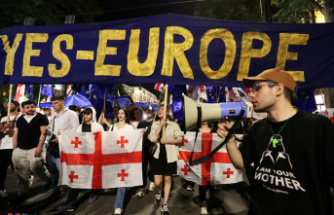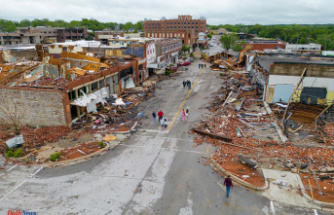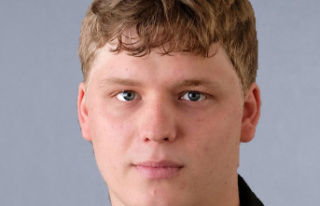Three months pregnant, Istabraq Baraka was only 17 years old and was about to pass her baccalaureate when her husband beat her with about fifty blows.
The murderer surrendered to the police but the trial stalled, plunging the family into relentless mourning since June 2021.
"Each time, the hearings are postponed and we don't know why," laments his mother Nazmiya, in her garden in Abassan, near the town of Khan Younis. Like her husband Souleiman, she hopes that the murderer will be sentenced to death, the only way to grieve.
The blows to Istabraq "were so intense that they caused a cerebral and pulmonary haemorrhage, the rib cage was shredded", say the parents.
Istabraq illustrates the plight of many Gazan women. 38% of wives living in this enclave governed by the Islamist Hamas and under Israeli blockade since 2007, have already suffered violence, physical or psychological, according to the latest figures for 2019 from the Palestinian Bureau of Statistics.
Six suspected feminicides or suicides linked to domestic violence were listed in 2019 in Gaza by the Women's center for legal aid and counselling. In 2020, 19 cases were recorded in this territory from which it is almost impossible to flee.
Some argue that Istabraq's husband, married a few months earlier, blamed him for taking money. Or for refusing to let his sister marry his brother-in-law. No matter, answer the parents, who go to his grave every Monday and Thursday.
- Obsolete laws -
For observers interviewed by AFP, domestic violence is on the rise in Gaza, due in particular to the coronavirus pandemic which has confined "survivors of violence with their attackers", notes the UN Women-Palestine.
But the figures are far from reality because "some women are unaware of their rights, others are afraid to go to court for lack of family support" and still others have internalized violence as a normal act in the couple, says Ayah Alwakil, lawyer at the Palestinian Center for Human Rights (PCHR).
The law in force in Gaza, unchanged since the 1950s, punishes with several years of imprisonment, even the death penalty, the men killing their wives. Unless they allege an honor killing, in which case the sentence is less.
These "obsolete and discriminatory laws" prevent the victims "from obtaining justice", regrets the UN Women-Palestine.
Rather than protecting women, the law confines them to their victim status, adds Mona Shawah, women's rights officer at PCHR.
If they obtain a divorce, they lose the right to custody of the children to the benefit of the husband or his family, at the age of nine for a son and eleven for a daughter.
Thus, a woman "prefers to be a victim and not to ask for a divorce. She knows very well that she will be the loser", notes Ms. Shawah.
- Beaten and tied up -
This was the case of Noha Khaziq, 31 years old and beaten for a long time. A resident of Gaza City, she had taken refuge several times with her family before returning to the marital home, the desire to stay close to her four children taking precedence over everything.
Until that day in February when her husband hit her again.
"He tied her up and left the house. When he came back, she was dead" of a pulmonary hemorrhage, says her brother Abdelaziz.
"We are satisfied that he has been sentenced to death but we ask that the sentence be applied quickly", says the one who, like the rest of the family, has not seen the children of Noha, sent to their family paternal.
In Gaza, a territory of 2.3 million inhabitants, only two homes take in about forty women victims of violence.
In the center run by Hamas's social affairs ministry, a woman sits in the corner of a room with yellowed walls, the right side of her face entirely covered with a bruise. She is about to return home despite past suffering, so as not to lose custody of her children.
"The law is not on the side of women in Gaza," admits Aziza Elkahlout, spokesperson at the Ministry of Social Affairs.
"We opened this center because women face injustice," she adds, also denouncing the Israeli blockade which worsens living conditions.
Souleiman Baraka blames the Gaza authorities who are partly responsible for the death of his daughter. "Because he does not make decisions, the government encourages the aggressor", believes this bruised father whose phone screen displays an outdated photo of him with his two little girls. The slowness of the procedures "encourages the criminals".












